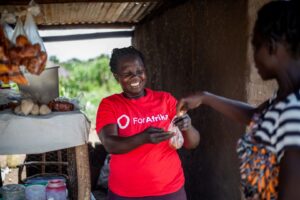Agriculture - Uganda
SMART Center
Current donation target:
CHF 390'579 von CHF 450'000 gespendet
The SMART project at a glance:
Location: West Nile, Northern Uganda
Who: 1,380 people (refugees and host community)
Period: 1 year (start January 2024)
Costs: CHF 450,000 from Schweizd ForAfrika (CHF 590,022 total costs)
“The services of the SMART Centers give farmers direct access to all the agricultural inputs they need. At the same time, their agricultural skills are improved in order to generate income and secure their livelihoods. […] Work opportunities are provided for women as well as men and young people. The centers will promote the processing and packaging of agricultural products such as rice, cassava and maize and ultimately serve as a market center for their sale.” – Fred Mutenyo, Director of Uganda ForAfrika
The situation – Refugees from South Sudan and Congo
“With over 1.5 million refugees in the country, Uganda remained the largest refugee-hosting country in Africa and the sixth largest host country worldwide in 2022.” (Source: UNHCR).
Hundreds of thousands of refugees from South Sudan or Congo are forced to abandon their homes due to violent conflicts. 80% of the refugees are women and children and many of them are fleeing to Uganda. Once there, however, they lack any basis for a life of independence.
SMART Center: A holistic project
The SMART Center is a training and development center for agricultural production and marketing.
With the construction of a building equipped for training, a warehouse, a mill, a refrigeration plant and a market, we are creating the necessary infrastructure to develop the activities in a safe place.
70% of the participants are refugees and 30% come from the host community.
In this way, we prevent conflicts and also stabilize the host community.
About 70% of the participants are women.
According to our theory of change (save, help, grow), the SMART Center is a three-stage project.
1 – We provide refugees with the basic elements of health and nutrition so that they can integrate socially.
In addition, we support them through the traumatic experiences of war with courses and training courses that focus on the integration of women, the importance of work and living together.
2- The second phase is agricultural training and field work in Mandela Gardens.
In groups of 10 people, we provide the group leader with know-how and tools and promote technological advances such as solar irrigation systems, machinery and high-yielding seeds.
We also provide training on soil and crop protection using scientific methods, best agricultural practices and the use of technology in the agricultural sector to improve farming methods.
3 – The final stage is the establishment and networking of ten agricultural cooperatives that can grant loans to small farmers: Training in savings and investment principles.
We will form savings groups through which participants will receive small loans and be advised on market demand.
In return for the support they receive, the participants, as growing entrepreneurs, give a small percentage of their profits to the SMART centers.
This enables them to become self-sufficient and help many more people in the community to become independent in the long term and promote healthy economic growth in the region.
The following goals are pursued with SMART:
- Increasing agricultural production and income through improved methods, post-harvest technologies and market access
- Application of environmentally friendly resource management to protect crops
- Access to affordable and sustainable financial products and services.
- Raise awareness of hostilities between refugees and host communities.
- Evaluation of lessons learned from the project as a basis for future initiatives, projects and strategies.
- With this project, we are also supporting the UN SustainableDevelopment Go als(SDGs) 1, 2, 3, 5 and 13.
Previous agricultural projects
Uganda ForAfrika therefore launched the first vegetable garden project in the Imvepi refugee camp in Uganda in 2017. The Palorinya camp was added later. In 2020, Uganda ForAfrika was appointed by the government and the UN organization UNHCR as the lead organization for food and livelihood security in the Imvepi camp.
The positive effects of our agricultural projects on the households involved are impressive: demonstrably improved health of the villagers due to the additional nutrients, strengthening of social cohesion between the refugees and even trauma recovery. Many of the participants are now able to support themselves, send their children to school and some have even been able to buy livestock and start their own businesses.
1×1 in vegetable growing
Our colleagues from Uganda ForAfrika, including trained agronomists, carry out the training courses on site. They train the participants in best practices for vegetable and grain cultivation and implement these together. Particular emphasis is placed on climate- and resource-friendly technologies. For example, how to create space-saving beds and keep moisture in the soil. Or how they can irrigate in the dry climate, for example by using waste water from washing and rinsing. Before the water is fed into the gardens, ash is added to neutralize the acid in the wastewater. Knowledge about different plants and their nutrients and active ingredients as well as tips on making compost and organic fertilizer are also taught.
We are planting independence!
Donate now and help Africa thrive!
Donations to Switzerland ForAfrika are tax-deductible.
More news articles

Rosemary – Progress as the fruit of saving
“In the future, I would like to turn my small store into a wholesale business. I also want to buy a mill to grind porridge

